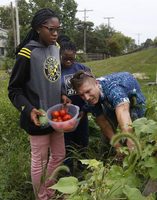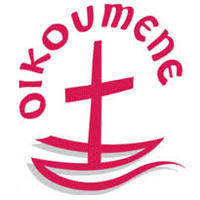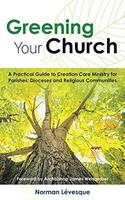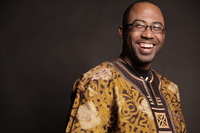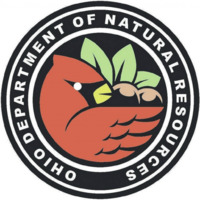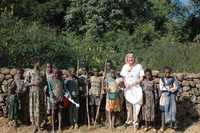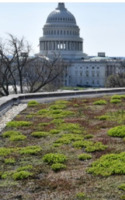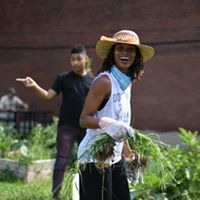Search
39 items
-
Pope Francis and Environmental Leaders Forge Vision for Global Action
Environmental leaders, activists and advocates gathered with Pope Francis for a two-day Vatican-organized conference with hopes to emerge with a shared vision for protecting our planet. The conference was inspired by the third anniversary of the Pope’s encyclical and was attended by political and religious leaders, scientists, economists and heads of civil society organizations. Inspired by the call for unity and action in the encyclical, UN Environment also introduced their Interfaith Rain-forest Initiative at the conference. -
Faith Based Farms
Faith Based Farms is a webinar about families and communities from across the United States demonstrating their faith through farming. Colm Flynn, a freelance reporter, conducted his research by traveling from New Jersey, to Wisconsin, and to Michigan. During his journey, he enjoyed conversations with a range of diverse individuals and faith-based groups. -
The Villa Farm
The Villa Maria, located in Villa Maria, Pennsylvania, describes itself on their website as the following: "Operating on 759 acres, the farm of Villa Maria Community Center is an integral part of the heritage of the Sisters of the Humility of Mary. The farm serves as a symbol of the struggle and sacrifice of a small group of women who settled on the Lawrence County land in 1864 and succeeded in establishing a viable, productive farm when others before them had failed. Land management at the farm is based on spirituality, sustainability, simplicity and the preservation of all local life systems." The greenhouse is open seasonally along with a produce market that sells the food grown. -
Columbus bonds with Ghana sister city through agriculture project
Roman Catholic Cardinal Peter Turkson spoke at Mershon Auditorium at The Ohio State University in 2015. The proceeds from his talk with OSU President Michael Drake were used as matching funds in a grant from the Initiative for Food and Agricultural Transformation (InFACT) discovery theme program. The proceeds funded an agricultural exchange between Accra, Ghana, and Columbus, Ohio. -
We Are What We Eat
The 214th General Assembly (2002) Presbyterian Church (U.S.A.) approved the following report titled We Are What We Eat. This report focuses on how people can influence the agriculture revolution with regard to sustainability, stewardship compassion, and community. The final section provides suggestions for activities and studies that congregations can engage in with regard to food production/consumption. -
WCC Executive Committee: global biodiversity crisis reaches urgent level
This article from the World Council of Churches discusses the current biodiversity crisis. The majority of land surfaces and ocean areas are significantly modified, and over 85% of the wetlands are gone. The following excerpt notes how this subsequently affects the poor and vulnerable:
"The statement notes that, increasingly, the drive for relentless expansion built into dominant economic systems are endangering the survival of many of God’s creatures. 'Ultimately our significant and adverse impacts on ecology will impact humanity’s own future,' the statement reads. 'Already they are destroying the very basis of sustenance of our income-poor, vulnerable and Indigenous sisters and brothers, who contribute least to the ecological damage for which human beings are collectively responsible.'" -
Going Vegan for Lent can Orient us towards Christ's calling
Elyse Durham writes that it is becoming increasingly common for people to give up meat for lent, and makes note that many of the farming practices we use today are unnecessarily cruel. In addition, the consumer culture in America tempts Christians to live lives of greed instead of virtue. Karen Swallow brings up the idea of "reducetarianism," simply considering the amount of meat you consume and its implications for the environment. Fasts and veganism are suggestions for Christians who want to move away from a life of over-consumption. -
Greening Your Church
"A Practical Guide to Creation Care Ministry for Parishes, Dioceses and Religious Communities," as this book's subtitle reads, author Norman Lévesque identifies and outlines strategies to creating environmentally friendly congregations. In 104 pages, learn about the theology of creation care ministry and how to green-ify your community to reduce impacts on God's creation. ISBN: 9782896466368 -
Interfaith Center on Corporate Responsibility
The Interfaith Center on Corporate Responsibility is an organization that advocates for better labor laws, financial services, sustainable development, and accessible health care. It is their mission to incorporate social values into corporate actions. Founded in 1971, the ICCR has been an integral part of advocating for resilient and sustainable corporations, but has been met with pushback from industries that do not want to follow regulation and social values. More information about programs, resources, and membership is available on their website. -
Profile: Rev. Dr. Heber M Brown
Rev. Dr. Heber M. Brown is a Baptist pastor in Baltimore, Maryland. Brown is committed to social development and has been instrumental in the creation of several programs in the Baltimore area. These include Orita’s Cross Freedom School, of which he is the founding director, and the Black Church Food Security Network. The latter works to support the accessibility of food by linking historically African American congregations with urban growers and Black farmers. Brown has received a number of awards recognizing his work, including the Ella Baker Freedom Fighter Award and the Food Justice Award from the Baltimore City Office of Civil Rights. -
Interfaith Rainforest Initiative
From the organization's website: "The Interfaith Rainforest Initiative is an international, multi-faith alliance that aims to bring moral urgency and faith-based leadership to global efforts to end tropical deforestation. It is a platform for religious leaders to work hand-in-hand with indigenous peoples, governments, civil society and business on actions that protect rainforests and safeguard those that serve as their guardians." The initiative focuses on raising awareness, mobilizing action, and influencing policy. -
Engaged Organizations: St. Vincent de Paul School, Mt. Vernon, OH
Creation care work at St Vincent de Paul School, Mt. Vernon, began in 2006 when the school received funding from the Knights of Columbus to purchase a dishwasher for their kitchen. Following this, the school began participating in the Hope Now program – an organization that provides used old donated doors to build tables. The school provides transportation to their annual K-6 field trip to The Brown Family Environmental Center at Kenyon College and their annual 5th grade summer camp through Lutheran Outdoor Ministries in Ohio (students take turns weighing food waste). Additional sustainability projects include collaboration with the parish and the local community. The school participated in an all-parish project through the Green Tree Plastics company’s A Bench for Caps sustainability program (students collected and sorted bottle caps in exchange for three benches). The school plans to create a grotto area using their three recycled benches. In order to foster green living and healthy community-school relations, the school provided planter flowers to local businesses.
Administrators at St. Vincent de Paul acknowledge the importance of maintaining social justice programs in accordance with Laudato Si's urgent message to care for the poor. Students from Beth’s Robinson's 6th grade social studies classes participate in a demographics project. Each year students select one continent, usually Africa, to learn more about the conditions of poverty. The class then raises money through various fundraisers and donate to parts of the continent through Catholic Relief Services. An upcoming project includes having students sew plastic bags together to create tarps to be donated to homeless shelters in the area.
-
Engaged Organizations: Recyclean, Inc. Kenosha, WI
Recyclean, Inc., is a deconstruction company located in Kenosha, Wisconsin, with a new branch to be opened in Columbus, OH in the near future. About 15 years ago, the owner recognized that there was too much waste entering landfills, as construction landfill waste is predicted to double by the year 2025. The company focuses on the reuse and recycling of materials and structures from the deconstruction work of their residential projects, which comprises 70 percent of their business, as a way to decrease the amount of materials that enter the landfills. Prior to renovations and tear downs, the company provides a quote for the materials and a 3rd party independent appraiser assigns value to the estimated donation value. Some of the materials are donated to community charities – i.e. Restores of Habitat for Humanity or Columbus Architectural Salvage. Homeowner are able to choose a charity based on the options provided by the company. Other materials, such as brick and wood, are recycled (purchased for use elsewhere). Recyclean, Inc. aims for 70 percent of the materials to be recycled and reused. The company also provides facilitation for the transfer, including delivery of materials and building structures, to their respective designated entities.
-
Engaged Organizations: Stratford Ecological Center
The Stratford Ecological Center is an organic farm and nature preserve that provides education sessions, tours, and hiking trails to the public. They also offer various workshops and classes on an ongoing basis.
Trinity Catholic Elementary School 4th and 5th graders participation each year in a 5-day environmental camp "Messages of the Earth" at the Stratford Ecological Center. -
Engaged Organizations: Habitat for Humanity Restore
Habitat MidOhio Restores aims to reduce costs associated with affordable housing construction as well as reduce the amount of waste going into landfills. Restores accepts new or used household items and materials from individuals or businesses. The proceeds then assist with Habitat MidOhio's administrative costs in building affordable housing.
Recycling Inc. often donates there following their building deconstruction projects. -
Engaged Organizations: Kenyon College Brown Family Environmental Center
The Brown Environmental Center at Kenyon College offers both self-guided and educational sessions that showcase their diverse range of natural habitats that are maintained at the center.
St. Vincent de Paul in Mt. Vernon, Ohio makes annual trips for their K-6 students. -
Low-Cost Construction Techniques for Earth Keepers
Technology for the Poor, a non-profit charitable organization based in Westerville, Ohio, discuss their techniques for low cost construction from an excerpt from their manual:
"The Construction Techniques described in this manual use straw as filler in wall sections. It further describes how one need not have to bale the straw to use it for wall construction. The author used the techniques described in this manual to build plastered straw structures in India and Pennsylvania. The pictures in the following pages should provide sufficient information for anyone to construct a low-cost, earth-friendly building using straw as building material for the walls." -
Christians and Endangered Species
Throughout time, it has often been difficult to reconcile concepts from both biology and theology. This article focuses on the critical impact of endangered species with regard to various Christian religions. Citing biblical text, especially the story of Noah’s Ark, many religions have deemed the preserving and caring for all living creatures to be of utmost importance. -
Tu' B'Shvat: The Green of Judaism
Tu B’Shvat: The Greening of Judaism is a handout from Interfaith Family. It offers a brief overview of Tu B’Shvat and different activities to celebrate the holiday. It also offers examples of how to be caretakers of the earth. To read the entire handout, click below. -
Ethiopia’s Church Forests
The beautiful forests of Ethiopia are rapidly disappearing due to human activity. However, the forests around the Ethiopian churches remain intact and teeming with diverse life. Dr. Margaret D. Lowman, known as Canopy Meg, has teamed up with one of these churches to study and survey the wildlife, mostly insects in the area. The children of the church community are being engaged to become the next generation of stewards in order to ensure that the forests and creatures are preserved. Project leaders also aim to help build walls in order to keep these forest areas more protected from human development. -
Environmental Statement – Reformed Church in America
In 1982, the Christian Action Commission of the Reformed Church in America (RCA) released a document titled “Care for the Earth: Theology and Practice.” This was given to General Synod, who then passed several resolutions outlining the Reformed Church in America’s stance on environmental issues. The Action Institute wrote the article below that discusses the resolutions that were passed. -
United Methodist Agency Green Roof
John Hill, from the Board of Church and Society at the United Methodist Agency, narrates the video below about their recent green roof addition. The series of squares used covers the entire area of the flat roof, reducing energy consumption, making the building cooler in the summer and warmer in the winter. In addition, and equally important, it reduces storm water runoff. When it rains, the water remains in the roof rather than adding pollutants into the nearby watershed, which feeds into the Chesapeake Bay. -
Seminary Hill Farm Community Supported Agriculture (CSA)
The Seminary Hill Farm website includes the following information on their community supported agriculture program:
"Transforming the traditional model of a CSA program, our program follows a new model that allows you to choose what items you would like week to week without having to commit to the entire season. Once the season begins, simply choose the items you would like to enjoy in your kitchen that week by visiting our website and meet us at one of our convenient locations to pick up your honestly fresh ingredients. We will have the items properly washed, packed and ready for you to take home and celebrate." -
Engaged Organizations: General Board of Global Ministries
General Board of Global Ministries discuss their vision and span of their work on their website. Their areas of impact run the gamut for a multitude of environmental and social justice issues:
"Connection is at the core of our work. Global Ministries connects The United Methodist Church, its people and congregations to partner with others engaged in God’s global work, which takes place in a variety of settings, countries and cultures.
Global Ministries works through missionaries and partners in more than 60 countries around the world. "




